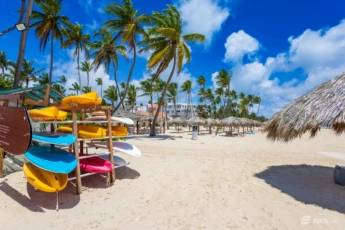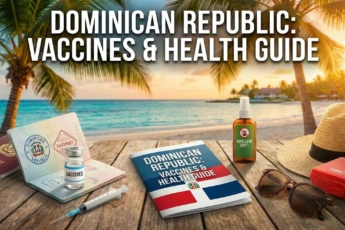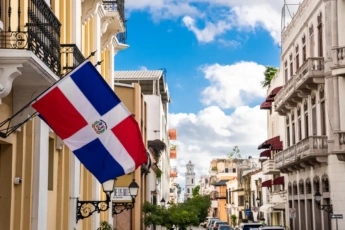Security Checklist of Safety in Punta Cana in 2026 – 9 Factors to Consider During Vacation
You are going on vacation and want to have a unique local experience while being safe at the same time. So where and how can you rent a great apartment in a safe gated community? With great food, beach access, and a great variety of activities around, what should we do to get it all? How can you make sure that the area you are going to is safe? What areas are centric, and what is nearby?
Imagine you are going on vacation with your family in the Dominican Republic. You selected Punta Cana as your destination. You want to have privacy, an ocean view, and walking distance to the beach because otherwise you need to rent a car, which in this particular case can be a headache. You want to rent a really unique place with a lovely turquoise ocean, palms, sand, and paradise.
Imagine yourself observing all these stunning pictures with those who you really love. You found the apartment of your dreams but now you are most likely worried about security. Let’s think about it together. What are the most important key factors of safety? What do you think?
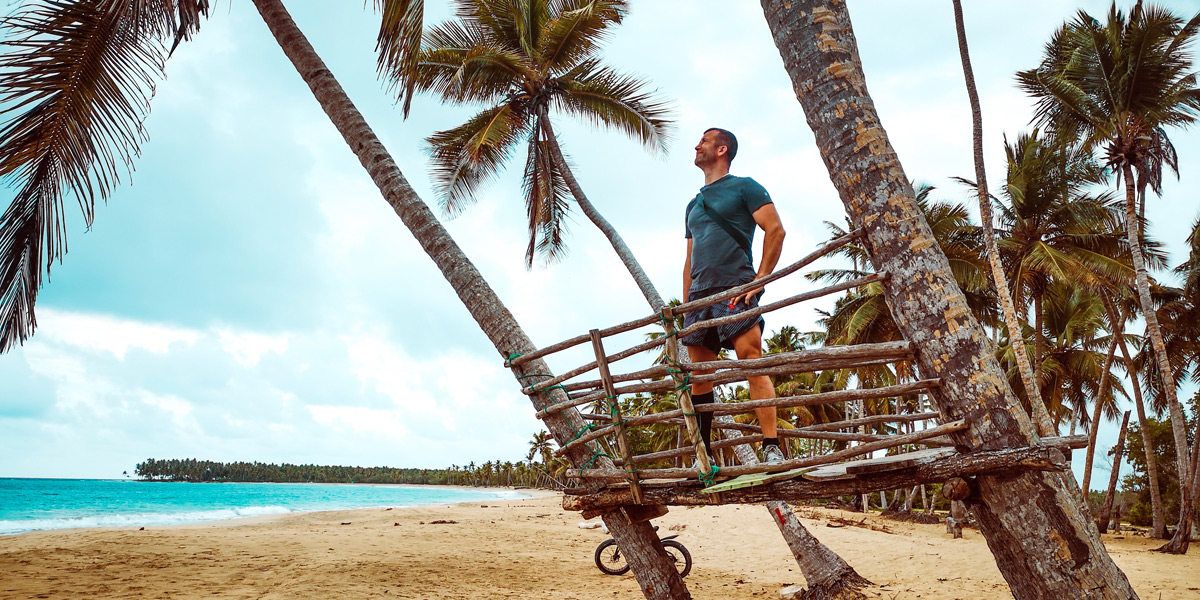
Vasiliy Smetanin. Punta Cana, the Dominican Republic.
This is Our Security Checklist 2026
- Secured gated community
- Security on the beach
- Management team
- The neighborhood!
- Cleaning and sanitary
- Water safety
- Food safety
- Legal services
- Transportation
A Closer Look at Safety Factors
in Punta Cana
Punta Cana is one of the most visited regions in the Dominican Republic, attracting millions of tourists annually. Safety is a top priority when selecting accommodations and activities in this tropical paradise. Below, we’ll explore crucial safety factors you need to consider to ensure a worry-free vacation, and provide a comparison table to make it easier to assess these elements.
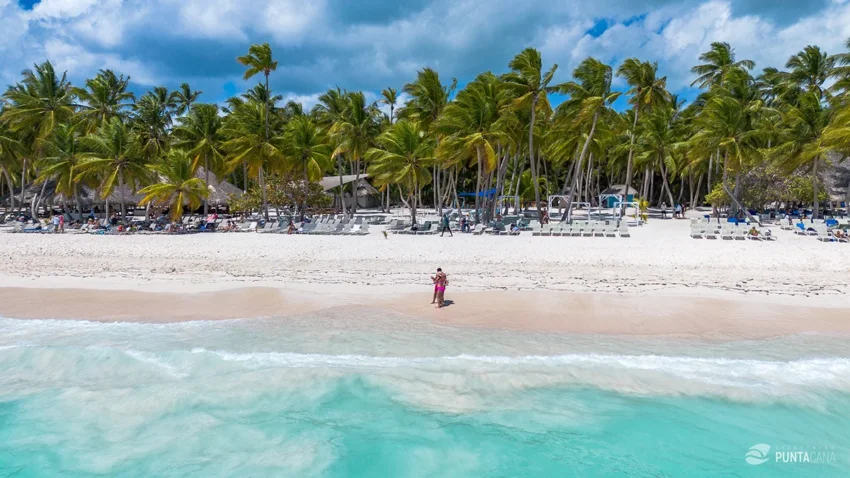
The Dominican Republic beach view
1. Secured gated community
One of the safest accommodation options in Punta Cana is staying in a secured gated community. These communities often come with 24/7 security, controlled access, and regular patrols by security guards. Not only does this ensure restricted entry, but it also provides peace of mind that you and your belongings are protected.
2. Security on the beach
Beach security is another critical aspect of safety in Punta Cana. Resort beaches often have lifeguards and security personnel to watch over guests and prevent theft. While enjoying your time by the water, avoid bringing expensive items like laptops or large sums of money, as these may attract attention.
3. Management team
When renting an apartment or villa, the quality of management can greatly affect your safety and comfort. A good management team ensures that any emergencies or issues are handled promptly. Always verify who manages the property and confirm their responsiveness. Renting from a reputable host or company can save you from headaches during your stay.
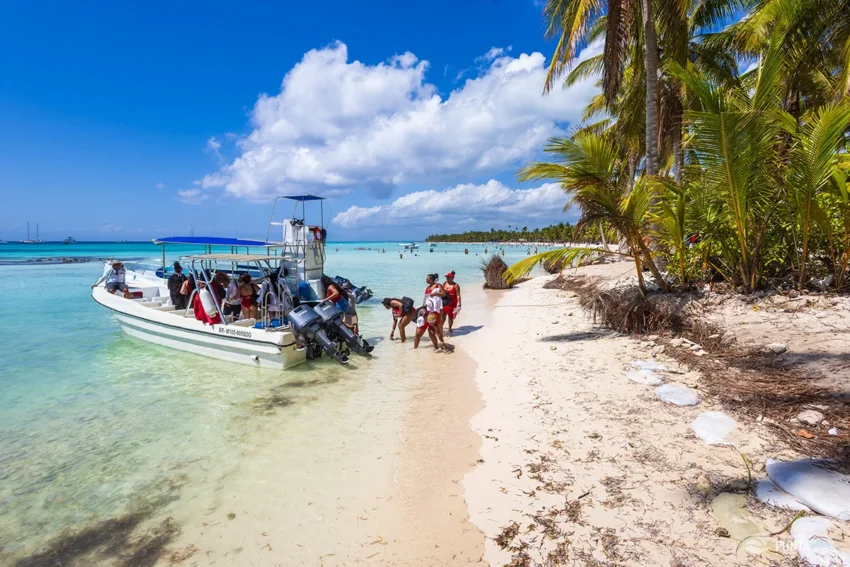
Saona tour from Punta Cana
4. The neighborhood
You need to rent in a good and safe neighborhood. You can go with the cheapest options and if you are renting the apartment for less then 50-70 USD you are probably not in a safe area. Consider that your host has to spend at least 25 USD for cleaning and other house chores.
Too much money… But how about bed bugs? Consider at least $300-$500 medical bills if you have any infection. Allergic to anything? You should pay even more attention to the neighborhood factor.
You need to make sure that you have at least some basics knowledge about the area you want to live in.
5. Cleaning and sanitary
This topic is huge. We still cannot understand how people can rent some apartments for 20 USD if cleaning services cost around 25 USD for a one-bedroom unit. Of course, if you really spend money and effort cleaning, detergents and cleaning materials are not cheap in the Dominican Republic.
Think twice before going cheap. Remember that our safety in Punta Cana is the main priority not only for you but for a host too. The good host will never save on these things; hence, the guests’ health is his economic health.
6. Water safety
In Punta Cana, tap water is not safe to drink. Only use bottled or purified water for drinking and brushing your teeth. Staying hydrated is especially important due to the tropical climate, so always ensure your accommodation provides access to clean, safe drinking water.
7. Food safety
If you buy groceries in the supermarket, you must wash your fruits and vegetables. Pay attention to this, because it is very important, especially in a tropical climate.
- Going to a restaurant? Make sure that it is big and that it has a warehouse to store products. Most small restaurants at the beach don’t have proper space for a warehouse, and I would buy some bottled beverages, but that’s it. Play smart and be safe—I guess it applies to any place you are going to.
- Alcohol. This is something. Even the best alcoholic beverages without smart consumption could make a lot of damage to your health. I won’t even mention the episodes when people mix alcohol with drugs or medicine.
Drugs… Stay away from this. Be smart. We would leave smoking cannabis to the countries where it’s legal – the Netherlands and some states in the US. Do not buy that kind of trash experience. It’s illegal in the DR.
8. Legal services
Illegal services – this is the biggest pain and a huge risk. Stay away from all cheap and illegal services: transportation, excursions, trips etc. If you book anything, make sure that they have a license to do this service. It’s rather easy math: you can save $10 on an excursion and then spend a whole day at the police department filling out the papers. And worst-case scenario: you go to an excursion and something happens. If they don’t have touristic insurance – you are on your own.
- One more reason. Let’s say there is a storm warning for today. All legal operators are canceling all trips and sending your money back! They are not going to put you at risk; they have responsibility. Why? They have a lot at stake. Getting a tourist license is not an easy task in the DR. Whereas all illegal operators steer out to sea and go ahead with their excursions no matter what. They need money now; they don’t have a long-term strategy.
And please don’t buy anything at the beach, but of course, it’s up to you to decide. Fake cigars, unlicensed excursions etc. – you can find plenty of these things.
9. Transportation
It is rather easy to save 5-7 USD and go with illegal transportation (transport facilities). What does illegal mean? – No license, no transportation check. Cheap propane equipment. Are you sure you want to have this kind of risk for 5-7 USD? I would never have put my family in such a situation.
9 main safety factors in Punta Cana
| Safety factor | Risk level in budget options | Safety measures in premium options |
| Secured gated community | Low or none | 24/7 Security, Controlled Access |
| Beach security | Limited to none | Lifeguards, Security Patrols |
| Management team | Often unresponsive | Professional Management, Immediate Support |
| Neighborhood safety | Higher risk | Safe, Gated Communities, Reputable Areas |
| Cleaning and sanitary | Low-quality, poor hygiene | Professional Cleaning, Regular Sanitization |
| Water safety | No guaranteed clean water | Bottled/Filtered Water Provided |
| Food safety | High risk at small vendors | Reliable, Large Restaurants with Safe Practices |
| Legal services | Unlicensed, uninsured | Licensed, Insured, and Safe Tour Operators |
| Transportation | Unlicensed, unsafe vehicles | Licensed, Inspected, and Insured Vehicles |
By focusing on these safety factors, you can significantly enhance your experience in Punta Cana, ensuring a memorable and safe vacation. Always prioritize safety when selecting accommodations, booking activities, and arranging transportation to minimize risks while enjoying your trip.
Safe Areas in Bavaro, Punta Cana
Now, let’s evaluate some specific areas in Bavaro. We are just taking some of them to illustrate the idea of proper safety checks in Punta Cana. In this way, you can evaluate any residence in Bavaro or Cap Cana. The most popular areas for vacation rentals are Los Corales, Cocotal, and Turquesa.
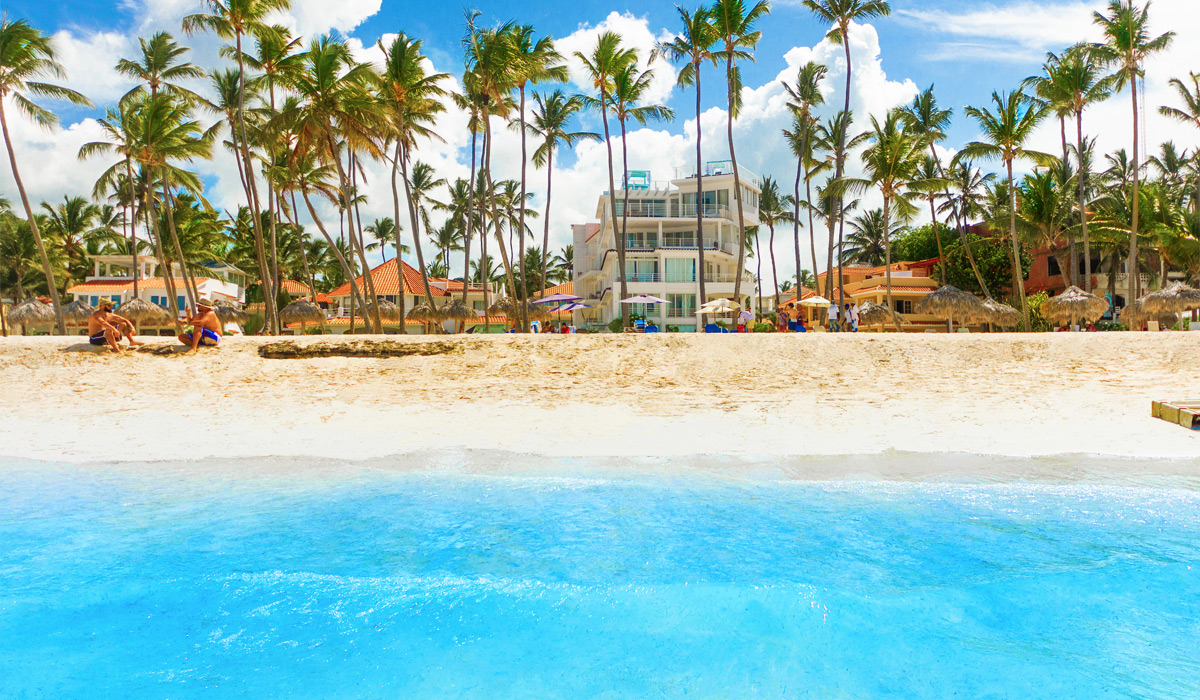
The Dominican Republic’s Beaches. Los Corales, Bávaro.
Los Corales Area
Positive in Los Corales:
- Security 24/7
- The best beach in the area looks like paradise and feels like paradise.
- Security on the beach
- In most cases beach chairs
- Super-centric – everything is within walking distance
Negative in Los Corales:
- When it rains, water could have some specific odor. It’s not dangerous for your health but still unpleasant. Though you can use this water for shower and if your host is providing such bottled water you can use it to brush your teeth.
- Street hustlers, unfortunately, they are everywhere. Just say no.
Cocotal Area
Positive in Cocotal:
- Security 24/7
- Amazing golf fields & central pool
Negative in Cocotal:
- It’s a closed gated community far from the beach at least 5-7 min driving
Turquesa Area
Positive in Turquesa:
- Super-centric – everything is within walking distance
Negative in Turquesa:
- This area is practically without drawbacks
Presidential Suits
Positive in Presidential Suits:
- Great area & hotel-style amenities
- Nearby to the beach
Negative in Presidential Suits:
- You need to walk 5-7 minutes to the city center, where all restaurants and activities are
Safe Apartments in Punta Cana
With the detailed safety tips in mind, booking a safe apartment in Punta Cana is crucial for a stress-free and enjoyable stay. Here are some prime examples of secure apartments located in reputable areas, ensuring both comfort and peace of mind:
-
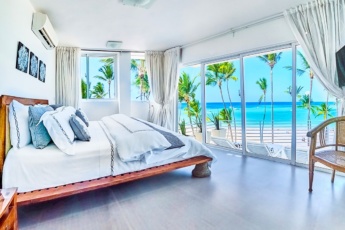
Condo for Rent in Punta Cana – Stunning Ocean View – Oreuga
from $735 / night View Details -
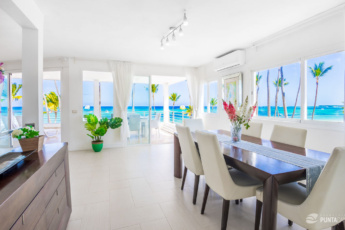
Beachfront Punta Cana Condo for Rent – Private Apartment with Stunning Oceanview, Bávaro, Los Corales
from $399 / night View Details -
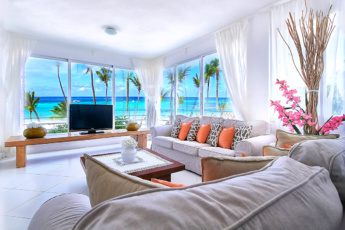
Dream Apartments for Rent in Punta Cana – Oreuga Ocean View Paradise
from $391 / night View Details -
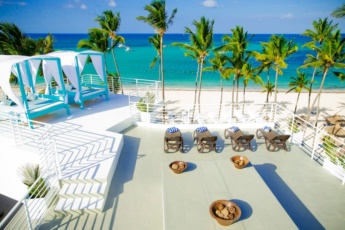
Event Venue for Rent in Bavaro Beach, Punta Cana
from $2000 / night View Details -
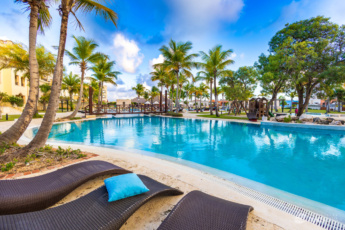
Spacious 3BR Condo in a Quiet Secure Cap Cana Residence – Private Pool, Large Terrace, Prime Marina Location
from $449 / night View Details -
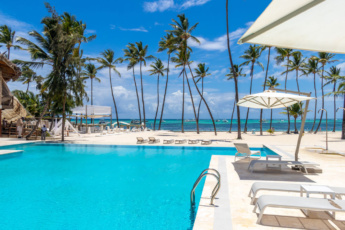
Quiet and Cozy Family Apartments for Rent – Directly on the Bavaro Beach, Punta Cana
from $299 / night View Details
With this information, you can plan your vacation with ease, ensuring you book a safe apartment, arrange secure transportation, and enjoy unforgettable excursions—all while prioritizing your safety. Safe travels and best of luck in creating your perfect Dominican Republic getaway!
Frequently asked questions about
safety in Punta Cana
Is it safe to travel to Punta Cana right now?
Yes, Punta Cana is generally considered safe for tourists. It is one of the most popular tourist destinations in the Dominican Republic, with resorts, gated communities, and tourist areas being highly secured. As with any travel destination, you should take normal precautions like staying in well-traveled areas, securing your belongings, and avoiding walking alone at night in less populated places. COVID-19 protocols may still be in place, so it’s wise to check for any travel advisories or entry requirements before your trip.
Is Punta Cana safer than Cancun?
Both Punta Cana and Cancun are popular tourist destinations with a focus on providing safe environments for visitors. However, safety depends on where you stay and how you travel.
- Punta Cana’s resorts and gated communities are known for being highly secure, and violent crime against tourists is relatively rare.
- While generally safe, Cancun has experienced higher levels of crime in certain non-tourist areas.
In both destinations, sticking to well-established tourist zones, using safe transportation, and avoiding risky behaviors can ensure a safe trip.
Can you brush your teeth with tap water in Punta Cana?
No, it is not recommended to brush your teeth with tap water in Punta Cana. The tap water is not purified for drinking, and even for brushing teeth, it’s safer to use bottled or filtered water. Ingesting tap water in the Dominican Republic may expose you to bacteria and lead to digestive issues. Most hotels and resorts provide bottled water for brushing and drinking, but it’s a good idea to stock up on bottled water if staying in an apartment or villa.
How can I avoid getting sick in Punta Cana?
To avoid getting sick during your trip, follow these guidelines:
- Avoid drinking tap water, including for brushing teeth.
- If you’re preparing food yourself, ensure produce is well-washed and, if possible, peeled.
- Stick to well-known or established places to avoid foodborne illnesses. Large restaurants and resort dining are usually safe.
- Carry hand sanitizer and use it regularly, especially after handling money or touching surfaces.
- Drink plenty of bottled water, especially in the tropical heat.
- While tempting, street food hygiene can be questionable. Stick to established eateries.
Is it safe to go off resort in Punta Cana?
Yes, going off-resort in Punta Cana is generally safe, especially to popular tourist spots like beaches, shopping centers, and restaurants. However, it’s important to remain cautious. Use reputable transportation services (licensed taxis or ride-hailing apps), avoid walking alone in unfamiliar or less crowded areas, and refrain from carrying large amounts of cash or valuables. Stick to well-known attractions, and if you’re unsure about a particular area, ask the hotel staff for guidance.
What to stay away from in Punta Cana?
When visiting Punta Cana, here are a few things you should avoid:
- Stick to bottled or purified water for drinking, brushing teeth, and even washing fruits.
- Avoid buying illegal drugs or unlicensed tours and excursions.
- Be cautious when purchasing from street vendors, especially cigars, souvenirs, or excursions. Some vendors may sell fake products.
- Ensure that your transportation (taxis, buses, excursions) is legally operated to avoid safety risks.
- While resort areas are generally safe, avoid traveling alone at night in lesser-known areas to minimize any risks.
Incorporating these guidelines into your trip can help ensure you stay safe and healthy while enjoying the beauty of Punta Cana.
Can you swim in the ocean in Punta Cana?
Yes, you can swim in the ocean in Punta Cana. The area is famous for its beautiful beaches with calm, warm waters, ideal for swimming, especially along the Caribbean Sea coast. Popular beaches like Bávaro Beach have clear, shallow waters that are great for swimmers of all levels. However, be mindful of weather conditions and flags that may indicate stronger currents, especially in the Atlantic Ocean areas.
Is Punta Cana safe at night?
Punta Cana is generally safe at night, especially within resort areas or gated communities where security is a priority. However, like in any tourist destination, it’s advisable to take precautions. Avoid walking alone in unfamiliar areas after dark, stick to well-lit, crowded places, and use licensed taxis or transportation services to move around safely. Resorts usually have bars and nightclubs on-site, which are safe and secure places to enjoy nightlife.
Are there health risks in Punta Cana?
While Punta Cana is generally safe for travelers, some health risks exist, primarily due to food and waterborne illnesses. The most common risks include:
- Traveler’s diarrhea can be caused by contaminated food or water. Avoid tap water and unwashed fruits or vegetables.
- While cases of dengue fever or Zika are not widespread, mosquito protection is recommended.
- The tropical climate can lead to severe sunburn or dehydration if proper precautions aren’t taken.
It’s recommended to take preventive measures such as using insect repellent, drinking bottled water, and staying hydrated.
Is traveler's diarrhea common in Punta Cana?
Yes, traveler’s diarrhea is relatively common in Punta Cana, as in many tropical destinations. It’s usually caused by consuming contaminated food or water. To avoid this, stick to bottled water, wash your hands frequently, and eat at reputable restaurants. It’s also a good idea to avoid eating undercooked or raw food from street vendors.
What vaccines do I need for Punta Cana?
There are no mandatory vaccines required for travel to Punta Cana, but the following vaccines are recommended:
- Hepatitis A to protect against food or waterborne illnesses.
- Hepatitis B for those who may come in contact with bodily fluids (e.g., during medical procedures or sexual activity).
- Typhoid – especially for those who may be visiting rural areas or eating outside of major tourist areas.
- Tetanus – routine vaccination is recommended.
- Rabies – if you plan to have close contact with animals or visit rural areas.
Consult your doctor before traveling to ensure you’re up to date on routine vaccines.
Updated on: . Author:

